Papa Vinyard here, now here's a little somethin' for ya...
This column will tackle an Oscar winner from each year starting with the inception of the Academy Awards in 1929. My goal is to highlight lesser-known films from throughout cinema history that were able pull down one (or more) of the Golden Statuettes that remain such an integral part of Hollywood lore. I will also take a close look at the actual element(s) that the film was given awards for, with my analysis on how they hold up with years (or decades) of cinematic history in the rearview since. Our subject this week is the 1932 winner for Best Director and Best Adapted Screenplay, BAD GIRL. Tune in next Sunday for my look at the 2009 winner for Best Foreign Language Film, DEPARTURES.
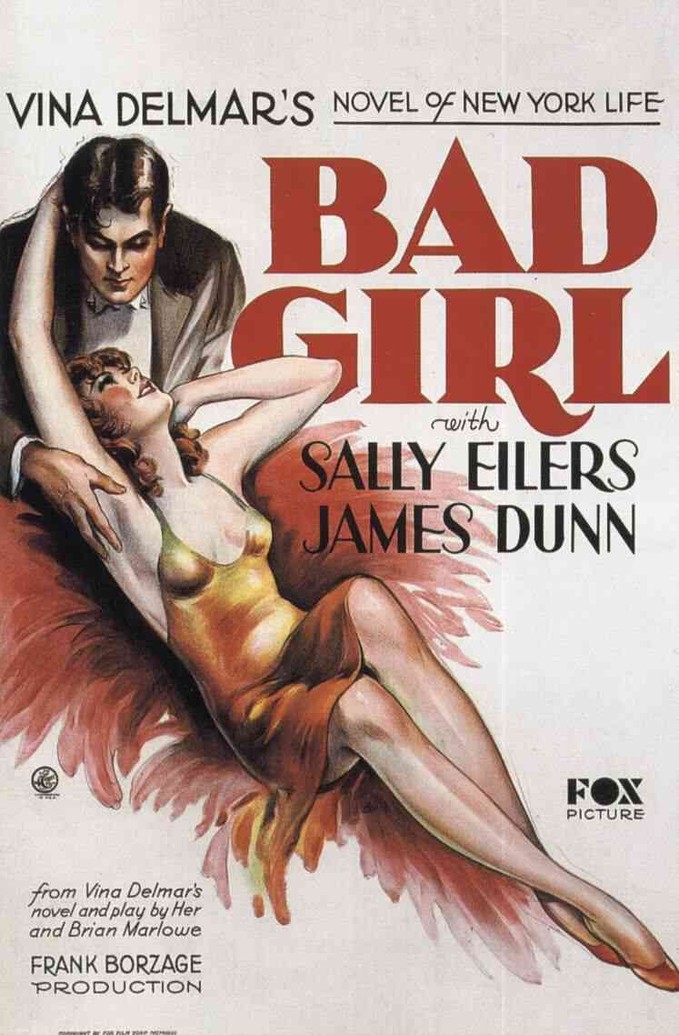
We open on a young bride getting ready for her wedding. It's an elaborate affair, with her elegant dress and impeccable hair totally matched by her equally elegant wedding procession. Turns out, she's on the job; she and her companions are merely modeling their gowns for prospective customers. A man tries to get fresh with her, and she freshly shoots him down. She tells another suitor that she can't go out with him because her (nonexistent) husband's an irritable prizefighter. This isn't her first rodeo. Afterwards, she complains to her pals; "All men are all alike. Rich or poor, when it comes to women, they only got one idea in their head!"
On a ferry from Coney Island, the woman, named Dot (short for Dorothy), exchanges some choice words with a fella, and her perspective changes. This porkpie-hat wearing guy, Eddie, is a fast-talker, and by directly challenging her free-spirit, he gets her attention immediately. Before long, the two are canoodling in his apartment until the wee hours of the morning (fully clothed and on the couch, of course). Dot knows that getting home late from their spooning will get her in trouble with her brother, so Eddie proposes a radical solution; accept his marriage proposal, and their jaunt wouldn't be them sneaking off together, it'd be them falling in love! When Dot's brother is up waiting for her when she gets home, she wastes no time in saying that she'll marry the guy she was out with; her brutish, stubborn brother is still unimpressed, and kicks her out of the apartment they share.
She moves in with her widowed pal, Edna, when she can't get ahold of Eddie for several days. She thinks she's been hung out to dry, but when Eddie resurfaces, he assures her he was just making preparations for their impending nuptials. They settle into married life comfortably at first, but Eddie puts the kibosh on Dot's until they are better off financially. Too bad nature runs its course prematurely, if you will, because before you know it, Dot's knocked up. She confides in Edna, but is scared to tell Eddie because of his plans to open his own shop with his saved-up dough. Again, too bad; Eddie, misreading Dot's melancholy, instead dumps the money into a large family home for the two of them, putting them in dire financial straits. He thinks of it as giving her a surprise gift; he's the one who's surprised when Dot freaks out about the fact that they have no more money, and lets the news about the impending birth.
When Dot drops the bombshell that she's preggers, Eddie gets knocked for a loop (in more ways than one), and the two begin slaving away to put aside enough money to raise the kid proper. Dot sets her sights on an upscale doctor to help her along until delivery, but since they can't afford him, Eddie desperately starts skipping meals, cutting down on cigarettes (oh, like they were that expensive back then), and moonlighting as a boxer, getting 10 bucks for every round he stays up (he don't mind the beating). But again, the couple refrains from honesty, and Eddie keeps his boxing secret, letting Dot believe his scrapes are from nightly barroom shenanigans. It's only a matter of time until the dishonesty, the financial situation, the stress of the pregnancy, or all three reach their breaking point, and make the couple evaluate the nature of their relationship and its future head on.
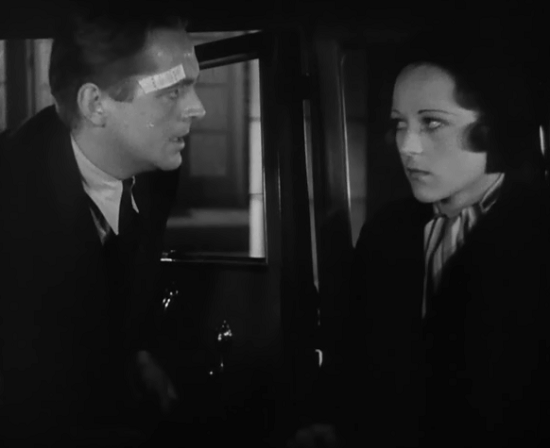
Well here it is, ladies and gents, my first negative Oscar Sunday review. It had to come sometime; I couldn't agree with ALL the Oscar winners I looked at for this column. But looking at this flick 80 years later, and I'm thinking to myself, "Wow, this got nominations, let alone two of the biggest awards of the whole industry?"
I can't say that I hated the experience of watching the film. It's not without its merits. There's a lot of pre-Code, Depression-era elements that are tickling in a superficial way, like the way Eddie refers to all women as "Janes" and the various sexual innuendos that are thrown in here and there. Early on, Dot complains that men always try and take the empty seat next to her at the movies, "And then that knee business starts!" While they're out, Dot asks Eddie to tell her he loves her, and he replies, "Right here in all the light?" Eddie makes a big stink of the large bed in his new marital home, a far cry from the great lengths Hays Code filmmakers would go to hide the fact that men and women sometimes *gasp* slept together (I can't imagine how that flew with audiences; as soon as I'd see Lucy and Ricky's separate beds, I'd be all, "Wait, exactly where did Ricky Jr. come from then?!").
But my qualms far overwhelm my praises on this one. The pre-Code touches are always undercut with some pandering, safe moral clean-up work, like when the couple spends the night together fully clothed, but still get treated as if they had a one-night-stand. It would be one thing if Dot's brother was angry at her for being the "bad girl" the title implied her to be, and jumping into bed with random charmers; it's another thing entirely for it to be the chaste seeds of true love he's protesting against, not only undercutting what could be some provocative domestic drama, but painting the brother as a selfish, demanding madman as a result.
The whole portrait of Dot as a "bad girl" is flawed and phony from the start. When we meet her, she's independent, sharp, tough, and seemingly wise. She knows who she is, what she wants, and that a man won't help her become better than she already is. But by the end of the first reel, we have Eddie taking her down with remarks like, "Listen sister, if you don't want guys to salute you, take down your flag," and, "If a man takes a pass at you, you want to call the police. If he doesn't, you call the army!" And Eddie's right. As the narrative tells it, she really was just waiting for the right guy to say the right thing to break her shell. Almost immediately, the standard notions of domestic bliss become quite alluring to her, and she wants a happy home with children above all else, including having an open, honest relationship with her befuddled, ambitious partner. If she had been a character like the one we were promised in the poster at the head of this article, this film might've been awesome; with the idealogical compromises they make to the character almost at the outset, it is simply a soap opera, tawdry "then this happens, then that happens" melodrama with little or no nuance or impact. It's an ugly spit in the face of progressive, liberal ideas in the service of two-dimensional, assembly-line storytelling. What a waste.
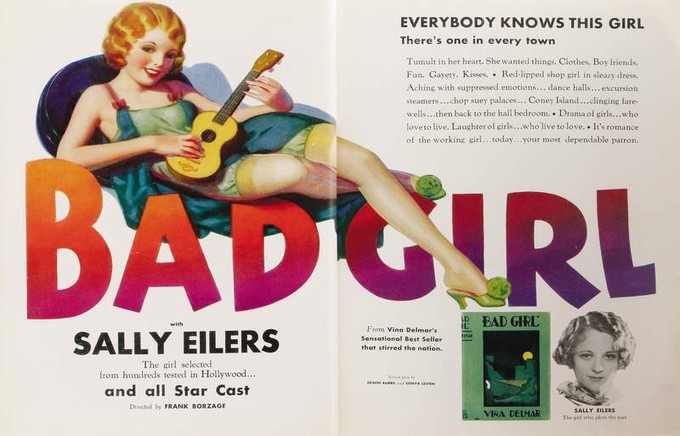
The narrative thrust on this thing is weak, and the plot meanders all the way to its conclusion. It starts out as the story about a young girl who is confident in her flapper ways as she deals with life and love in the big city. Then it's about the young couple getting their lives together and setting up a family, even though Eddie's priorities are more financial while Dot just wants a kid. And finally, it becomes the tale of this selfless fella beating himself up (literally) to give his wife what she wants without her knowing his sacrifice. The first plotline's the best, and the least cliched (at least in 1932), but it gets dropped by the 15 minute mark when Eddie proposes marriage as a way of legitimizing staying out late on their first night together. Then, it devolves to hopeful, melodramatic drivel based on miscommunications and coincidences (funny that the most famous obstetrician in town happens to be a massively understanding sweetheart…), and sheds no light on what it was like to love, work, or struggle during that difficult time in American history.
While several of the stylized barbs got some chuckles out of me, most of them just came off as the result of an overworked (or underworked) screenwriter. Think about Tarantino's dialogue compared to all those Tarantino clones from the late-'90s; sure the lines sound cute and clever on the surface, but they're clearly hackneyed echoes of the real thing (Ben Hecht, who I discussed in my first Oscar Sunday, was running circles around wannabe fast-talk writers with stuff like THE FRONT PAGE and SCARFACE). Edwin J. Burke (who would go on to work on the Shirley Temple pictures BRIGHT EYES and THE LITTLEST REBEL, as well as BROADWAY MELODY OF 1936) received credit (for "Continuity and Dialogue") alongside Vina Delmar and Brian Marlowe, who wrote the play the film was based on (which, itself, was sourced from the novel by Delmar). According to IMDB, there was also some uncredited work done by Rudolph Sieber, a German assistant director and production manager (and longtime husband to Marlene Dietrich) who never wrote a screenplay before or since. Only Burke took home the award for his efforts, but I'm thinking that the collaborative efforts of the screenwriters to make Ms. Delmar's source material into an interesting and workable film did the final product more harm than good (especially considering she'd get her own Oscar nomination a few years later for the must better-remembered Cary Grant comedy, THE AWFUL TRUTH).
The direction fares better than the screenplay, but not by much. There are attractive setups here and there, such as the faux-wedding opening, a dialogue scene that tracks Dot and Edna through a lively party, and an effortlessly impressive shot with Eddie and Edna conversing while movers furnish Eddie's new home in the background. There's some well-staged boxing footage late in the film that successfully evokes the feel of a low-level bout. But the movie often feels clunky, stale, and ill-fitting, even in its staging. There's way too much screentime featuring Eddie and Dot discussing their relationship in city stairwells; half-an-hour into the feature, and you've spent most of your time with these two flirting on some stairs. Which would be fine if their dialogue was crackling, but again, Capra this ain't. There's a jet-black moment with a woman reporting a death in her family that is striking, but completely distracts from the more frothy lovey-dovey stuff going on elsewhere in the scene. It's like a Coen Brothers scene or something, where the grim subtext of the bit is that no matter how happy this couple thinks they are, they're just biding time till the grave. It doesn't fit at all, and is an example of the director trying to spruce things up, but in the process undercutting the very thing he's trying to accomplish; sometimes I like those sort of what-the-fuck touches, but here, it stops the film dead cold, and calls attention to how ramshackle and thrown together the whole thing seems.
I also feel that way about some boxing footage late in the film. It's well-staged, and has the feel of a low-level bout, but it's about as far as you can get from the story of Dot that the film started out as. While the *SPOILER ALERT* turn of the competing boxer stretching out the fight for Eddie's sake *END SPOILER* is kinda touching, it's also completely unbelievable and doesn't really do anything to advance the plot. Just another distraction. Equally distracting is the performance of Billy Watson as Edna's son, Floyd. In the sequence inside Edna's house, Floyd is constantly causing carnage throughout, injecting the tense scene with slapstick comedy that sticks out like a sore thumb. I understand that a film, back then, was the whole package, and without the comfort of sitcoms and The Tonight Show to come home to, audiences wanted to run through the whole gamut of emotions. I just wish they saved the boxing and slapstick stuff for the shorts and newsreels, and let this feature try and squeak by on its own (admittedly scarce) merits. Director Frank Borzage had already won a previous Oscar for the Janet Gaynor romance 7TH HEAVEN (the first Best Director award ever given), and would land some successes after this, including the Helen Hayes/Gary Cooper A FAREWELL TO ARMS, but I was unimpressed by his apparently Oscar-worthy efforts here. Maybe I had to have been there...
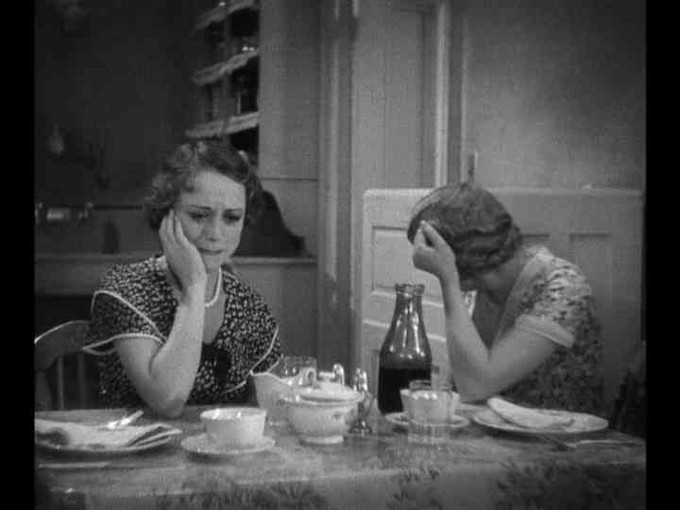
Perhaps my favorite aspect of the whole film is the title performance by Sally Eilers. Dot starts out as, if not a "bad girl", then a worse one than what she ends up as. She talks sass, curtly rejects the advances of men, and lives comfortably as a post-Jazz Age free-spirit. Her self-confidence and dignity are palpable. Even when Dot suddenly shifts from being a party girl in it for herself to a selfless housewife with a ticking biological clock, it still feels like the same character. We buy that she loves this guy enough to change her lifestyle for him without provocation, and we sort of get why she wouldn't want to unload the news of her pregnancy on him as he excitedly begins to build their life together. Ms. Eilers nabbed the role away from the more famous Janet Gaynor, who'd worked with Frank Borzage before and whose bankability more than eclipsed hers. Thankfully, Eilers' charm and vulnerability shone through, and she may be the film's only unabashed success. Unfortunately, she was denied a nomination, and her screen career peaked with this film, leaving her Dot as the hidden testament to her dramatic potential and her relaxed, human screen presence.
The other performances are a mixed bag. I like Minna Gombell in the Kim Cattrall-type role of the older, been-there-done-that wisecracking pal, even if it was a probably something of a cliche even then. She has a tough exterior, but her feelings of sisterhood towards Dot are right there on her sleeve, and a bit where she takes Dot's brother's side against her before walking out on him herself (despite his romantic advances toward her) is surprisingly cute. But William Pawley, reprising his role from the Broadway production, is terrible as Dot's brother, Jim, all posture and full-volume hollering with nary a shred of humanity to be found. It's just a cameo, to be sure, but it's a crucial role, and as Pawley plays it, the guy's a thuggish monster who Dot is more than better off living away from.
James Dunn's co-lead performance as Eddie also did not work for me. Eddie's supposed to be a cad, all banter and wisecracks on the surface, and selfless, devoted mush on the inside, but he constantly comes off as a slick huckster willing to bet it all on the big score. He huffs his dialogue, peppering it with his trademark defuser, "Okay!", like he's pitching goods to housewives instead of seducing the love of his life. Which would be fine if he were the loser husband that Dot needs to get over. But when the narrative turns him into the Best Husband Ever, willing to get his ass handed to him by boxers to ease his wife's stress in increments (which *SPOILER ALERT* turns out to be unnecessary due to the OB/GYN's charity *END SPOILER*), the character becomes hyper-idealized and dehumanized.
Suddenly, the film confirms what the audience has already suspected: this film isn't about a normal, flawed couple struggling to make a life together, it's about this couple, and these two are so willing to sacrifice everything for the other that there's no way it won't work out. There's no arc, no growth, only the knowledge that the characters have and their responses to the new information that trickles their way as time goes on. Sort of like a sitcom. Except not funny.
Maybe if Dunn's performance showed the level of honesty and humanity that Eilers shows no problem evoking, maybe the film's central relationship could be something worth investing in. As is, experiencing the film is like watching two constructed characters meet each other and find love, despite the best efforts of the plot contrivances standing in their way. I'm not saying it's Dunn's fault; what I am saying is that if I had to make a call, I'd say that he's more part of the problem and less part of the solution (which, in my eyes, no one ever came up with). He's the only member of the principal cast to win his own Academy Award (for his supporting role in A TREE GROWS IN BROOKLYN), but delivers my least favorite performance in the film (aside from maybe Pawley's).
Plus, over the course of his 50+ film credits, Dunn played 18 characters named either Jimmy, Johnny, or, as in this film, Eddie. Not sure what that says, or even if it says anything. But, you know, that's there.
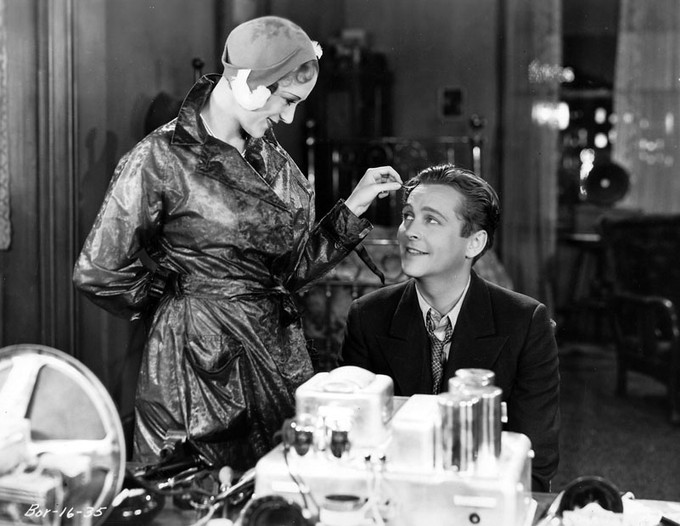
It's genuinely a wonder that this film landed as softly on me as it did. I knew that somewhere down the line, one of these Oscar-winners wouldn't wow me as it did the Academy voters (and I certainly thought that THE BIG HOUSE had won for the wrong category). I had figured it would be a Best Costume or Best Sound Mixing winner or something (honestly, I had quite low expectations for THE IRON LADY when I went in). You know, something that was impressive technically but didn't have much of a spirit or life to it. I was ready for that.
But this movie was called BAD GIRL. It had won Best Director and Best Screenplay a year when King Vidor's THE CHAMP (featuring THE BIG HOUSE's Wallace Beery), UNDERWORLD director Josef von Sternberg's SHANGHAI EXPRESS, and the Fredric March DR. JEKYLL AND MR. HYDE were also in contention. Appropriately for the column, I'd never heard of it. Plus, the film doesn't seem to have ever been released on home video, and I could seemingly only access the film on Youtube. How could I resist?
The film's rep wouldn't have dissuaded me, had I bothered to check it out before watching the flick. The New York Times throws it heaps of praise, describing it as "a tender and appealing shadow story", "blessed with truth and simplicity," with a "thoroughly human peformance (by) James Dunn." Its current rating on IMDB is 6.7/10, a full couple of points higher than what I'd give it. Variety's description of BAD GIRL as a "workmanlike job" is even a little too generous, but at least hints at the unsurprising studio sameness of the actual film. It's not that it's a terrible movie or anything. It just isn't really that effective as a melodrama, a love story, a comedy, or anything. A movie about the character as played by Sally Eilers in the first reel going out and about and exercising the limits of pre-Code censorship could've been awesome.
But alas, instead of being a good movie about a bad girl, this one turned out to be a bad movie about a good girl, an ode to the kind of domestic bliss that would become a mainstay of American television two decades later (oddly enough, James Dunn would star in one of these shows, taking the lead role in the sitcom It's A Great Life in the mid-'50s). It's heavy on the coincidence and forced plotting, and light on the genuine character beats and humanity. The attempts at humor are forced and arbritary, if not quite as hackneyed and boring as the attempts at drama. Racking my brains, I genuinely can't figure out why the Academy voters decided to bestow this film with two of the "big five" awards that year. Here's a case of me straight-up disagreeing with the legacy they've given the film, and an instance of an honoring that probably made a lot more sense at the time it was made than with the better part of a century in the rearview.
PREVIOUS ENTRIES:
UNDERWORLD (1927): Best Writing (Original Story)
SEARCHING FOR SUGAR MAN (2012): Best Documentary
THE BROADWAY MELODY (1929): Best Picture
THE IRON LADY (2011): Best Actress
THE BIG HOUSE (1930): Best Writing, Best Sound Recording
IN A BETTER WORLD (2010): Best Foreign Language Film
TABU (1931): Best Cinematography
LOGORAMA (2009): Best Short Film (Animated)
-Vincent Zahedi
”Papa Vinyard”
vincentzahedi@gmail.com
Follow Me On Twitter
